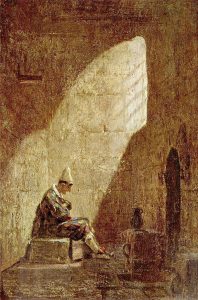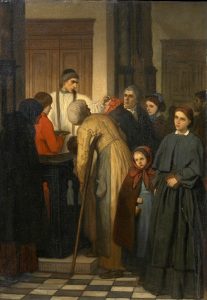Thoughts on Sunday’s Lessons for Feb. 14, 2024 (Ash Wednesday)

Ash Wednesday (c.1855-1860), oil painting on wood by Carl Spitzweg (1808-1885). Staatsgalerie Stuttgart, Stuttgart, Germany. (Click image to enlarge.)
First Reading: Joel 2:1-2,12-17
Ash Wednesday is the first day of Lent, a season set aside for acts of devotion and sacrifice as we reflect on the wrongs that we have done and on the simple truth that we will not live forever. Our first reading is from the Prophet Joel, one of the minor prophets. The book that bears his name is only three chapters long, and modern theologians aren’t even sure when he lived. We know that “Joel” means “The Lord is God” in Hebrew; and Joel may have prophesied after the return from exile to Jerusalem. Much of the short book deals with the people’s prayerful response to a plague of locusts, and in that setting, this alternate reading offers a liturgical look at a period of penitence and sacrifice … something to think about as we enter Lent.
Alternate First Reading: Isaiah 58:1-12
Our readings for Ash Wednesday, the beginning of the penitential season of Lent, begin with a warning from Isaiah. The prophet cautions the people that public demonstrations of fasting, prayer, sackcloth and ashes are not enough to please God. God expects us to show our righteousness instead in service and love of neighbor. As Jesus would later teach, Isaiah declares that God calls us to oppose injustice: free the oppressed, feed the hungry, house the homeless, and clothe the naked.
Psalm: Psalm 103 or 103:8-14
God, who made us from dust, knows well that we are but dust. We are human: broken and sinful, often wicked. Yet God’s compassion and God’s mercy are far greater than God’s anger. God does not punish us as we might fear that our sins deserve, but rather shows mercy wider than the world itself, forgiving our sins and welcoming us in a parent’s warm embrace.
Second Reading: 2 Corinthians 5:20b-6:10
In his second letter to the Corinthians, Paul devotes a lot of energy to working out an apparent quarrel with the people of this contentious little church community. In this passage he speaks of reconciliation. He enumerates the many pains he has endured as a servant of God, and calls on the people to accept God’s grace and work together in Christ, who reconciled us with God by taking human form and dying for us.
Gospel: Matthew 6:1-6,16-21
It is hard to imagine a more appropriate reading for Ash Wednesday than Matthew’s account of Jesus, midway in the Sermon on the Mount, teaching us how best to practice almsgiving, prayer, fasting, and self-denial of worldly pleasures. All of these have become traditional Lenten practices. Simply put, in words that might remind us of the Isaiah reading for this day, Jesus advises us to practice humble piety. Shun hypocrisy. Don’t show off. Keep our charity, our prayers and our fasting private. Don’t brag about our fasting. Don’t hoard fragile, transient earthly riches, but store in heaven the treasures that last.



